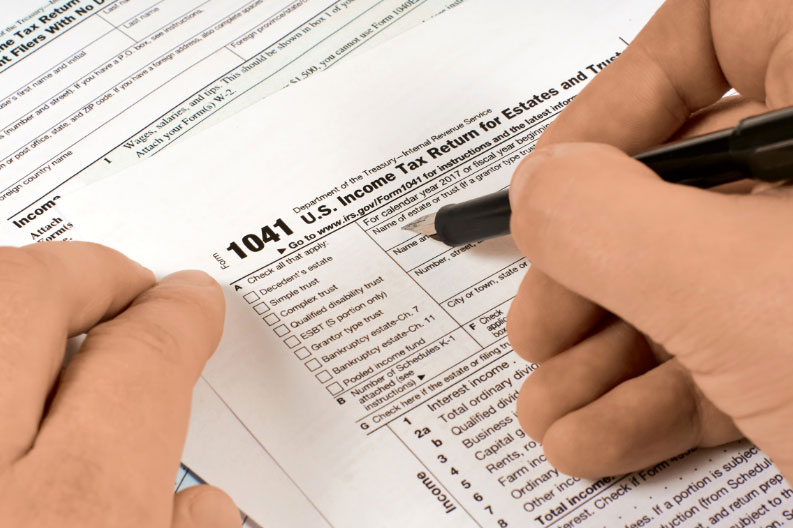Taxes and 1041 form filling procedures can be overwhelming for an estate or trust beneficiary. Form 1041, which is used to report income from trusts and estates, has some detailed instructions and pointers to help you complete it correctly.
Definition of IRS Form 1041

Interest from investments that haven't yet been passed to beneficiaries or from the deceased's wages that haven't yet been paid out might be a source of revenue for an estate. You must report all of this on Form 1041 to the IRS. An estate can owe both an estate and an income tax.
An estate receives only revenue from the date of the borrower's death until the estate is closed reported on IRS Form 1041. You can use deductions to offset such revenue. The decedent's final tax return, which is a distinct document that the estate's executor must submit, must include any income received before the decedent's death.
When Should You File it?
If the trust earned more than $600 in gross income during the tax year, had a nonresident alien beneficiary, or had any taxable income, it must submit a return. If the estate's gross income exceeds $600 or if a nonresident alien is a beneficiary, a return is required.
1041 shows the trust or estate's retained and disbursed income, but the trust or estate only pays taxes on the distributions if required by law. Capital gains and losses are part of the trust's corpus. Thus unless the trust instrument states otherwise, they are not subject to distribution.
What if you're a trustee of a trust that mandates that all dividends from a stock portfolio are split evenly between all of its members? You need to report the income of dividend on 1041, and you must disclose each beneficiary's share of income on Schedule K-1s. To file your tax return, you must provide a copy for each beneficiary. You also have to attach all copies to Form 1041.
IRS Form 1041: Who Uses It?
Form 1041 must be filed by the executor or personal representative of an estate when the estate receives income. The estate of a deceased person will not include all of their belongings. Payable-on-death designations on bank and investment accounts ensure that the money will flow directly to the designated recipient upon the account holder's death. The executor would not file tax returns for the estate due to this income.
To be taxed, a trust must own and hold an asset that generates income, and the same rule applies. Section 641 of the IRC mandates that a domestic trust's trustee file Form 1041 if the trust earned any taxable income during the tax year.
Trusts can be simple or complex in most circumstances. As soon as a simple trust receives money, it must distribute it to its beneficiaries. Principal, the property by which it was originally funded—cannot be retained or bequeathed. In the eyes of the law, a trust's earnings and losses belong to it and cannot be passed on to its beneficiaries.
When is the Due Date of Form 1041?
The tax year for estates is not usually the same as the traditional calendar year for filing Form 1041, which is an essential distinction. When an estate owner dies, their calendar year begins on that day and concludes on December 31 of the following year.
When an executor files an election, the tax year ends on the last week of the month preceding the anniversary of the deceased's death. After that, the executor has a window of up to a year to file the tax return. Four months following the end of the tax year, the estate tax return is usually due.
As an illustration, consider the following: All of Joe's assets were divided by his executor by December 15 of the same year after he passed away on June 1. They earned $1,200 before you transferred the assets to the recipients.
Because this amount exceeds the $600 exemption, the estate must submit an income tax return. However, if a fiscal year is chosen, the tax year begins June 1 (the day of death) and ends December 31 (the day of the executor's death). If a fiscal year is selected, the tax year ends from May 31 of the next year.
Who has to Pay Tax for Estates?
If the estate's assets are dispersed to the beneficiaries before they begin to generate income, the estate is not liable for income taxes. That money is taxed on behalf of the recipients in this scenario. Form 1041, Schedule K-1, will be provided to each recipient, letting them know how much and what kind of income they need to record on their tax returns (Form 1040).



